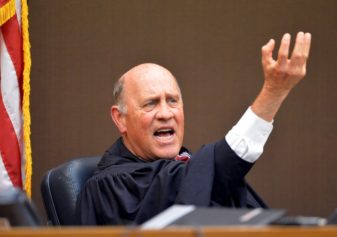The clearest indication of how much Beverly Hall’s much-heralded career as an educator was irrevocably stained by what happened at the end is the fact that almost all of the stories written about her passing away yesterday have been primarily about the Atlanta cheating scandal.
Four decades as an educator, rising through the ranks in New York City, one of the toughest and most politically cutthroat school systems in the country, becoming Superintendent of the Year as head of Atlanta schools, and it all gets boiled down to a few paragraphs about a test cheating scandal that continues to hover over Atlanta like a dark cloud.
It is a reality that would cause Hall considerable pain if she were alive to see it. But at the same time, she wouldn’t have been surprised. She understood the media; she knew that it wasn’t personal—that reporters cared most of all about the story.
For most of her career, this worked to her advantage. It was the glowing headlines over the years that helped her rise, from one of nearly 100,000 teachers toiling away in a New York City classroom to become one of the most celebrated superintendents in the country. While she didn’t necessarily court the press as aggressively as many of her colleagues, she didn’t run away from it, either.
She was a proud Jamaican-born woman who still had a hint of a Jamaican accent in her speech, though all the years in New York had almost erased it.
I got to know Hall over the years as an education reporter who seemed to have to cover her wherever I went. We used to laugh about how closely our careers and our geographic moves seemed to parallel one another. When I was a reporter for New York Newsday in the late 1980’s and early 1990’s, assigned to cover the Queens schools, Hall became the superintendent of a Queens school district, No. 27, that was always rife with infighting and racial tension. In other words, it was one that always was in the headlines.
When I was promoted to cover the entire school system in the early 1990s, Hall in 1994 was promoted to become deputy chancellor of instruction for the entire school system, the largest in the country. Part of her job was to explain what was happening in the classroom to reporters who didn’t always understand it.
When I moved to Newark, New Jersey, in 1995 to cover education for the Star-Ledger, Hall was appointed as superintendent of Newark schools. When she looked up and saw me for the first time, she could only smirk and shake her head.
Right around the time I left the Star-Ledger in 1999, Hall moved to Atlanta and took over its public school system.
When I called Hall and told her I had moved to Atlanta a decade ago, she laughed out loud in disbelief.
If she got tired of seeing my face, she never told me.
Though I was still working in Atlanta as a journalist, at least this time I didn’t have to cover her—though I did have family members attending Atlanta public schools, as my own children eventually would.
Her claim to fame was creating the circumstances that pushed poor students to succeed. In 2009, the American Association of School Administrators named Hall as National Superintendent of the Year, singling out Atlanta’s “significant gains in student achievement over the past 10 years.” Naturally all of those gains required a heavy focus on tests scores. And that’s what ultimately got her into trouble.
The Atlanta cheating scandal became the worst in the country and immediately placed an ugly mark over every teacher and every student in Atlanta who actually did stellar work.
Investigators reported that cheating took place in 44 schools—nearly half the schools in the system—with nearly 180 educators involved. They slammed Hall with the accusation that her top staff “created a culture of fear, intimidation and retaliation.”
The question of how much Hall knew about the cheating was never satisfactorily answered. Many were hoping for the question to be probed thoroughly in her criminal trial. She faced charges that included racketeering, making false statements and theft. She was among more than 30 APS educators who were indicted in March 2013 and was set to be tried starting last year with 12 other former educators who had not agreed to plea deals. But her attorneys said she was too sick from breast cancer treatments to stand trial.
Yesterday she succumbed to the disease at 68.
All those years of work in innumerable classrooms, laboring away in all those dusky corridors and steamy administrative offices, and it ends like this—with the words “cheating scandal” in the first sentence of her obituaries.
